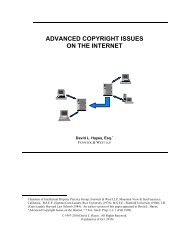Paramount Pictures Corporation v. ReplayTV, Inc., Joint Stipulation ...
Paramount Pictures Corporation v. ReplayTV, Inc., Joint Stipulation ...
Paramount Pictures Corporation v. ReplayTV, Inc., Joint Stipulation ...
Create successful ePaper yourself
Turn your PDF publications into a flip-book with our unique Google optimized e-Paper software.
12345678910111213141516171819202122232425262728shall promptly notify the subscriber of the nature of the request and whatgovernment agency has requested the information prior to responding unlessotherwise prohibited from doing so by law.” See Cal. Penal Code § 221.5.Although Defendants are not technically within these statutes— at least until theybegin transmitting programming over their own Internet Channels later thisyear— the statutes evidence recognition of the significance of privacy interests oftelevision consumers. Indeed, in Sony itself, a key concern for Justice Stephenswas “ the privacy interests implicated whenever the law seeks to control conductwithin the home.” Paul Goldstein, Copyright’ s Highway (1st ed. 1994), at 150.Consistent with these principles, Defendants’ privacy policies haverepeatedly assured consumers that privacy of their viewing information is “ a right,not a privilege.” Pignon Decl. 9, Ex. D. Defendants’ policy no less than fivetimes assures users that, if any anonymous viewing information is collected aboutthem, it will never, without their express permission, be linked to or associated withpersonal identifying information. Id. at 11. The policy provides that “ whensending a show from one <strong>ReplayTV</strong> 4000 to another, the <strong>ReplayTV</strong> Service doesnot track or receive notification of which show is being sent or which shows yourecord.” Id. at 32, Ex. D.Plaintiffs now propose this Court should ignore well-established privacyprinciples to order creation, collection, and use of information in a manner neverdisclosed to users, contrary to the policy, and without ability for the customer to optin or out. It is axiomatic that consumers’ privacy interests are shaped by theirreasonable expectations at the time they enter into a relationship, transaction orcircumstance. See, e.g., California v. Greenwood, 486 U.S. 35 (1988); U.S. v.Scott, 975 F.2d 927 (1st Cir. 1992); Larson v. Harrington, 11 F.Supp.2d 1198(E.D.Cal. 1998); Pittman v. MacIntyre Co., 969 F. Supp. 609 (D. Nev. 1997);Pettus v. Cole, 48 Cal. App. 4th 402 (1996). The SONICblue Privacy Policy, as54
















